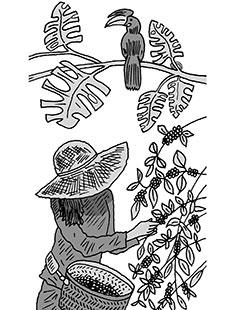In Short: Birds and Coffee, Extending Fertility, and More

A study co-written by Charlotte Chang *17, now a postdoc at the University of Tennessee, found that birds thrive in COFFEE PLANTATIONS in India. The findings, published in Scientific Reports in February, compared farms growing two different types of coffee, arabica and robusto. It found that while bird diversity is slightly higher on arabica farms, both types can support an abundance of bird life as long as there is adequate tree cover. The study shows that farming can be compatible with conservation efforts.
As women enter their mid-30s, their eggs decline in quality, but a study by molecular biology professor Coleen Murphy offers some hope. Studying microscopic worms called C. elegans, Murphy found that administering a particular protein inhibitor during worms’ reproductive periods could lead to higher-quality eggs overall. Published in Current Biology in February, the finding suggests we might eventually EXTEND FERTILITY in humans by three to six years and reduce rates of miscarriages and birth defects.
We all know the guilty feeling of throwing a soda can into the trash. Research by psychology professor Elke Weber and others, however, finds a stronger motivation than guilt for driving ENVIRONMENTALLY CONSCIOUS DECISIONS: pride. In their study, published in PLoS One in November, the researchers used a variety of tests to determine people’s feelings about environmental decisions, concluding they were more likely to make eco-conscious decisions if they anticipated pride, rather than guilt. The findings offer insight for creating environmental-education campaigns.
You’d be forgiven for giving little thought to the hairs on a BAT’S TONGUE. But chemical and biological engineering professor Pierre-Thomas Brun has found they make all the difference in the animal’s ability to slurp up nectar. Using laser-cut molds from elastic polymer, Brun and colleagues from MIT found that bat tongues are optimized for nectar intake, with a combination of hair density, lapping speed, and liquid thickness allowing them to suck up 10 times more nectar than if their tongues were smooth. The findings, published in Physical Review Fluids in February, suggest bats, bees, possums, and other creatures developed hairy tongues for evolutionary advantage.
Scientists have long thought that sugar is digested mainly in the liver. Too much of it can lead to a host of ailments, including obesity, diabetes, and liver disease. But a study of mice led by chemistry professor Joshua Rabinowitz found that FRUCTOSE (fruit sugar) is mainly digested in the small intestine. It’s only when the gut is overwhelmed that the overflow moves to the liver and colon, potentially creating problems. The study, published in Cell Metabolism in February, suggests people should limit the amount of sugar intake at any one time, especially sugary drinks outside of mealtimes.











No responses yet